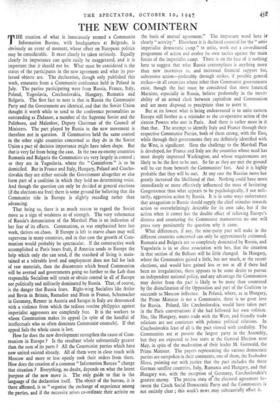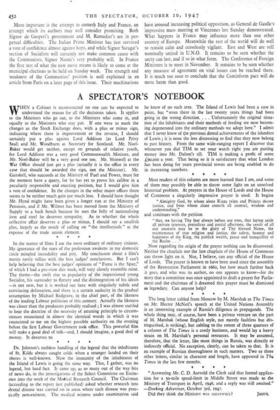THE NEW COMINTERN
THE creation of what is innocuously termed a Communist Information Bureau, with headquarters at Belgrade, is obviously an event of moment, whose effect on European politics may be considerable. It must clearly be taken serionsly. Equally clearly its importance can quite easily be exaggerated, and it is important that it should not be. What must be considered is the status of the participants in the new agreement and what its pro- fessed objects are. The declaration, though only published this week, emanates from a Communist conference held in Poland in July. The parties participating were from Russia, France, Italy, Poland, Yugoslavia, Czechoslovakia, Hungary, Rumania and Bulgaria. The first fact to note is that in Russia the Communist Party and the Government are identical, and that the Soviet Union thought it worth while to send to the conference personalities as outstanding as Zhdanov, a member of the Supreme Soviet and the Politburo, and Malenkov, Deputy Chairman of the Council of Ministers. The part played by Russia in the new movement is therefore not in question. If Communists held the same control in the other eight countries concerned as they do in the Soviet Union a pact of decisive importance might have taken shape. But that is very far from being the case. In the two ex-enemy countries Rumania and Bulgaria the Communists are very largely in control ; so they are in Yugoslavia, where the " Cominform " is to be domiciled. But in France and Italy, Hungary, Poland and Czecho- slovakia they are either outside the Government altogether or else form part of a coalition in which they hold no determining voice. And though the question can only be decided at general elections (if the elections are free) there is some ground for believing that the Communist tide in Europe is slightly receding rather than advancing.
That being so, there is as much reason to regard the Soviet move as a sign of weakness as of strength. The very vehemence of Russia's denunciation of the Marshall Plan is an indication of her fear of its effects. Communism, as was emphasised here last week, thrives on chaos. If Europe is left to starve chaos may well supervene in many countries, and in that case the growth of Com- munism would probably be spectacular. If the constructive work accomplished at Paris bears fruit, if America sends to Europe the help which only she can send, if the standard of living is main- tained at a tolerable level and employment does not fail for lack of raw materials, then the discontents which breed Communism will be averted and governments going no further to the Left than responsible Socialism will retain or obtain control in all of Europe not politically and militarily dominated by Russia. That, of course, is the danger that Russia fears. Right-wing Socialists like Attlee and Bevin in Britain, Ramadier and Blum in France, Schumacher in Germany, Renner in Austria and Saragat in Italy are denounced with a violence from which the tedious routine philippics against imperialist aggressors are completely free. It is the workers to whom Communism makes its appeal (in spite of the handful of intellectuals who so often dominate Communist counsels). If that appeal fails the whole cause is lost.
How far does the new development strengthen the cause of Com- munism in Europe ? Is the resultant whole substantially greater than the sum of its parts ? All the Communist parties which have now united existed already. All of them were in close touch with Moscow and more or less openly took their orders from there. How does the creation of a common "Information Bureau" change that situation ? Everything, no doubt, depends on what the latent 'purpose of the new move is. The only guide to that is the language of the declaration itself. The object of the bureau, it is there affirmed, is to "organise the exchange of experience among the parties, and if the necessity arises co-ordinate their activity on the basis of mutual agreement." The important word here isl clearly "activity." Elsewhere it is declared essential for the "anti imperialist democratic camp" to unite, work out a co-ordinated programme of action and evolve its own tactics against the main forces of the imperialist camp. There is on the face of it nothing here to suggest that what Russia contemplates is anything more than new incentives to, and increased financial support for, subversive action—preferably through strikes, if possible general strikes—in all countries where other than Communist governments exist, though the fact must be considered that more fanatical Marxists, especially in Russia, believe profoundly in the inevit- ability of an armed clash between capitalism and Communism and are more disposed to precipitate than to avert it.
But at its lowest what is being endeavoured is to unite eastern Europe still further as a rejoinder to the co-operative action of the sixteen Powers who met in Paris. And there is rather more in it than that. The attenipt to identify Italy and France through their respective Communist Parties, both of them strong, with the East, while through their governments they are definitely identified with the West, is significant. Here the challenge to the Marshall Plan is developed, for France and Italy are the countries whose need has most deeply impressed Washington, and whose requirements are likely to be the first to be met. So far as they are met the ground will be cut from beneath the Communists' feet. And it is highly probable that they will be met. At any rate the Russian move has greatly increased the likelihood of that. Nothing could have more immediately or more effectively influenced the mass of hesitating Congressmen than what appears to be psychologically, if not mili- tarily, aggressive action by Russia. It is in some ways unfortunate that antagonism to Russia should supply the chief stimulus towards action so overwhelmingly desirable for its own sake, but if the action when it comes has the double effect of relieving Europe's distress and countering the Communist manoeuvres no one will press very persistently the question why it came.
What differences, if any, the nine-party pact will make in the different countries concerned can only be approximately estimated. Rumania and Bulgaria are so completely dominated by Russia, and Yugoslavia is in so close association with her, that the situation in that section of the Balkans will be little changed. In Hungary, where the Communists gained a little, but not much, at the recent elections, and would have gained less or not at all if there had been no irregularities, there appears to be some desire to pursue an independent national policy, and any advantage the Communists may derive from the pact is likely to be more than countered by the disinclination of the Opposition and part of the Coalition to succumb to Moscow influence. In Poland, where, as in Hungary, the Prime Minister is not a Communist, there is no great love for Russia. Poland, like Czechoslovakia, would have taken part in the Paris conversations if she had followed her own volition. She, like Hungary, wants trade with the West, and friendly trade relations are not consistent with polemic political relations. In Czechoslovakia least of all is the pact viewed with cordiality. The Communists are at present the largest party in the Assembly, but they are expected to lose seats at the General Election next May, in spite of the moderation of their leader M. Gottwald, the Prime Minister. The papers representing the various democratic parties are outspoken in their comments, one of them, the Svobodne Slovo, pointing out with justice that the pact includes the three German satellite countries, Italy, Rumania and Hungary, and that Hungary was, with the exception of. Germany, Czechoslovakia's greatest enemy. The precise state of the electoral agreement be- tween the Czech Social Democratic Party and the Communists is not entirely clear ; this week's news may substantially affect it. More important is the attempt to enmesh Italy and France, an attempt which its authors may well consider promising. Both Signor de Gasperi's government and M. Ramadier's are in per- petual difficulties. The Italian Prime Minister has just survived a vote of confidence almost against hope, and while Signor Saragat's section of Socialists will certainly not make common cause with the Communists, Signor Nenni's very probably will. In France the first test of what the new move means is likely to come at the municipal elections to be held on Sunday week. The strength and weakness of the Communists' position is well explained in an article from Paris on a later page of this issue. Their machinations have aroused increasing political opposition, as General de Gaulle's impressive mass meeting at Vincennes last Sunday demonstrated. What happens in France may influence more than one other country of Europe. Meanwhile the rest of the world will do well to remain calm and ceaselessly vigilant. East and West are still nominally united in U.N.O. It remains to be seen whether the unity can last, and if so in what form. The Conference of Foreign Ministers is to meet in November. It remains to be seen whether any measure of agreement on vital issues can be reached there. It is much too soon to conclude that the Cominform pact will do more harm than good.



































 Previous page
Previous page